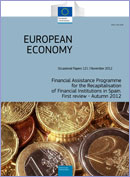|
|
|
|
|
|
 |
 |
 |
 |
Commission presents Blueprint for deep and genuine Economic and Monetary Union (EMU)
The European Commission presented the “Blueprint on a Deep and Genuine Economic and Monetary Union (EMU)” on 28 November. In a deep and genuine EMU, all major economic and fiscal policy choices by Member States would be subject to deeper coordination, endorsement and surveillance at the European level. The path detailed in the Blueprint involves incremental measures taken over the short, medium and longer term. Part of the agenda can be delivered on the basis of the current Treaties, while part of it requires Treaty change. The Blueprint is the Commission’s contribution to the report of the “four presidents” on the next steps for a deepened economic and monetary union. A final version of the report is being prepared by the President of the European Council in coordination with President Barroso, the President of the European Central Bank and the President of the Eurogroup, and will be discussed by the European Council on 13-14 December.
|
 |
 |
 |
|
 |
 |
 |
 |
 |
|
 |
 |
 |
This blueprint aims at creating not only a sketch of the final architecture of the economic and monetary union, but it also provides a credible, realistic building plan for completing the construction.
Olli Rehn, Vice-President of the European Commission for Economic and Monetary Affairs and the Euro |
 |
|
|
|
 |
 |
 |
 |
Commission adopts 2013 Annual Growth Survey kicking off European Semester
The European Commission adopted the 2013 Annual Growth Survey (AGS) on 28 November. The AGS sets out five priorities designed to guide Member States through the crisis to renewed growth. It kick-starts the European Semester for economic policy coordination, which ensures that Member States align their budgetary and economic plans with the Stability and Growth Pact and the Europe 2020 strategy. According to the AGS, while EU policies are beginning to show results – deficits are coming down, tensions in financial markets are easing and there are signs that competitiveness is improving in some Member States – continued reform is needed to generate sustainable growth and jobs. For this reason the Commission has recommended focusing on the same five priorities that were identified in last year’s Survey:pursuing differentiated, growth-friendly fiscal consolidation; restoring normal lending to the economy; promoting growth and competitiveness for today and tomorrow; tackling unemployment and the social consequences of the crisis; and modernising public administration.
|
 |
|
 |
 |
|
 |
 |
 |
 |
Commission calls for in-depth reviews of 14 countries under Macroeconomic Imbalance Procedure
On 28 November, the European Commission initiated the second cycle of the Macroeconomic Imbalance Procedure (MIP) with the publication of the Alert Mechanism Report (AMR). The MIP aims to correct and prevent damaging macroeconomic imbalances. Based on the AMR, which is the first step in the new round of the MIP, the Commission has called for in-depth reviews in 14 EU Member States: Belgium, Bulgaria, Denmark, Spain, France, Italy, Cyprus, Hungary, Malta, the Netherlands, Slovenia, Finland, Sweden and the United Kingdom.For twelve of them, an in-depth analysis was already carried out in the MIP 2012, and imbalances – varying in nature and severity – were found to exist. These countries received policy guidance through the country-specific recommendations under the European Semester in May. In the case of Malta and the Netherlands, it will be the first time that an in-depth review under the MIP is carried out.
|
 |
|
 |
 |
|
 |
 |
 |
 |
Eurogroup gives green light for launch of national procedures for next EFSF disbursement to Greece
In a statement issued on 27 November, euro area finance ministers agreed that Member States may now launch the relevant national procedures required for release of the next disbursement of EUR 43.7 billion to Greece from the European Financial Stability Facility (EFSF). The Eurogroup welcomed the updated assessment of the Troika that Greece has implemented the commitments under its adjustment programme in a satisfactory manner. These include a wide ranging set of reforms, as well as the budget for 2013 and an ambitious medium-term fiscal strategy for 2013-16. On the basis of these measures and conditional upon their strong implementation, euro area Member States are now willing to consider a number of initiatives, such as lowering interest rates and extending the maturities of Greece’s financial assistance package, in order to ensure a credible and sustainable reduction in Greece's debt-to-GDP ratio to 124% of GDP by 2020. The Eurogroup expects to be in a position to formally decide on the disbursement by 13 December, subject to the completion of national procedures and following a review of the outcome of a debt buy-back operation by Greece.
|
 |
|
 |
 |
|
 |
 |
 |
 |
Eurogroup welcomes ESM decision to authorise EUR 39.5 billion disbursement for Spain
Concluding a Eurogroup meeting on 4 December, Euro area finance ministers welcomed a decision by the European Stability Mechanism (ESM) to authorise the disbursement of up to EUR 39.5 billion to Spain. The disbursement is the first tranche of the programme for Spain. During their meeting, ministers reviewed progress on the bank recapitalisation programme in Spain, which was adopted in July this year to overhaul weak segments in the country’s banking sector. Funds from this disbursement will be used to reinforce the most severely affected financial institutions, as well as to capitalise a newly-created asset management company which will acquire and manage banks’ underperforming assets. In a related development, the Commission concluded that the restructuring plans of four Spanish banks are in line with EU state aid rules. The Commission's approval clears the way for the banks to receive aid from the ESM.
|
 |
|
 |
 |
|
 |
 |
 |
 |
EU finance ministers set to agree on changes to banking regulation; discuss “two-pack” for tightened economic governance
At the ECOFIN Council meeting on 4 December, EU finance ministers agreed to hold an extra meeting before the European Council meeting on 13-14 December, in order to reach agreement on the Commission proposal of 12 September for establishing a single supervisory mechanism (SSM) for the oversight of credit institutions. The SSM is part of a broader plan to establish a banking union. Agreement would enable negotiations with the European Parliament to start with the aim of approving the texts before the end of the year. Finance ministers also discussed progress in negotiations with the European Parliament on two draft regulations aimed at further improving economic governance in the euro area. The “two-pack” of Commission proposals includes a regulation for enhanced monitoring and assessment of the draft budgetary plans of euro area member states, and a regulation on enhanced surveillance of euro area member states that are experiencing severe financial disturbance or request financial assistance.
|
 |
|
 |
 |
|
 |
 |
 |
 |
EU Court of Justice upholds legal basis of European Stability Mechanism
The Court of Justice of the European Union has upheld the validity of the European Council decision establishing the European Stability Mechanism (ESM). The ruling, which was issued on 27 November, was a response to the claim by a member of the Irish Parliament before the Irish courts that the amendment to the Treatyon the Functioning of the European Union (TFEU) by a European Council decision was unlawful. The Court of Justice ruled that the amendment does not encroach on the exclusive competences held by the EU in the areas of monetary policy or the coordination of the economic policies of the Member States. The Court also reaffirmed the right of Member States to conclude between themselves an agreement for the establishment of a stability mechanism such as the ESM Treaty, provided that the commitments undertaken are consistent with EU law.
|
 |
|
 |
 |
|
 |
 |
 |
 |
Commission report identifies policies for unlocking full potential of Single Market integration
The “Report on the State of the Single Market integration (2013)” was released on 28 November. It presents an analysis of the state of Single Market integration and looks at the main barriers to a better functioning Single Market, especiallyin areas with the greatest growth potential, such as services, networks and the digital economy. The report’s objective is to identify policy priorities, which if carried out by Member States, would contribute to unlocking the full growth potential of the Single Market, and to removing any remaining obstacles to further integration. The report also calls for efforts to be stepped up to ensure better implementation and enforcement of rules that are already in place.The first edition of the report accompanies the Annual Growth Survey 2013. Because responsibility for its implementation is shared between the EU and the Member States, the Single Market is one of the pillars of the European semester.
|
 |
|
 |
 |
|
 |
 |
 |
 |
Commission presents Action Plan to clamp down on tax evasion and avoidance
The Commission has presented an Action Plan for a more effective EU response to tax evasion and avoidance. The Action Plan announced on 6 December comprises a comprehensive set of measures, for now and for the future, to help Member States protect their tax bases and recapture the billions of euros legitimately due. Around one trillion euros is lost to tax evasion and avoidance every year in the EU. The Commission has also adopted two Recommendations: one encouraging Member States to identify tax havens and place them on national blacklists and another suggesting ways to address the legal technicalities and loopholes which some companies exploit to avoid paying their fair share. To maintain momentum in the fight against tax evasion and avoidance, the Commission will set up active new monitoring tools and scoreboards. The Action Plan and Recommendations will now be presented to the EU's Council of Finance Ministers and the European Parliament.
|
 |
|
 |
 |
|
|
|
 |
 |
 |
 |
Financial Assistance Programme for the Recapitalisation of Financial Institutions in Spain.First review - Autumn 2012, European Economy. Occasional Papers. 121. November 2012.
This report provides an assessment of the progress made by Spain with respect to its Financial Assistance Programme for the Recapitalisation of Financial Institutions in Spain. It is based on the findings of a joint mission to Madridfrom 15-26 October 2012 conducted by the European Commission, the European Central Bank, the European Banking Authority and the European Stability Mechanism. The International Monetary Fundalso participated in the meetings as part of its independent monitoring. The mission found that the reform of the financial sector is on track. The ambitious policy conditionality of the programme has so far been met in a timely and high-quality manner. It will be important to maintain the momentum in the coming months as major challenges lie ahead, in particular the effective restructuring of banks and the set-up of the Asset Management Company (AMC).
|
|
 |
 |
|
|
|
|
|
|
|
|
|
|
|
 |
| Directorate-General for Economic and Financial Affairs |
 |